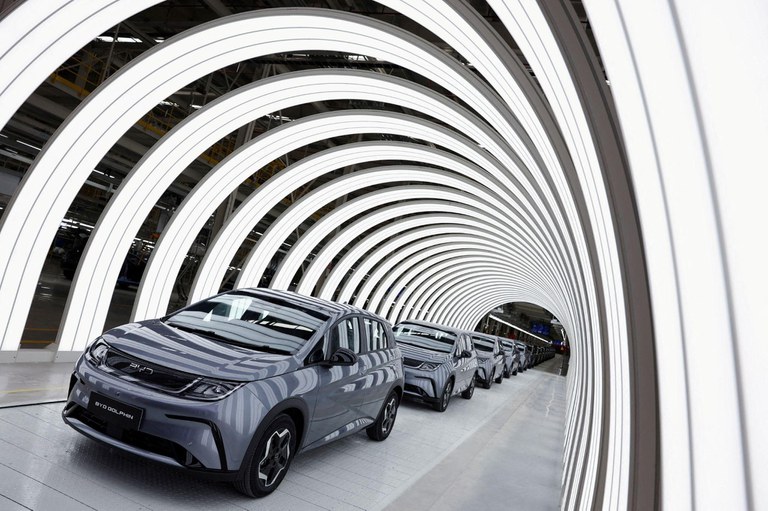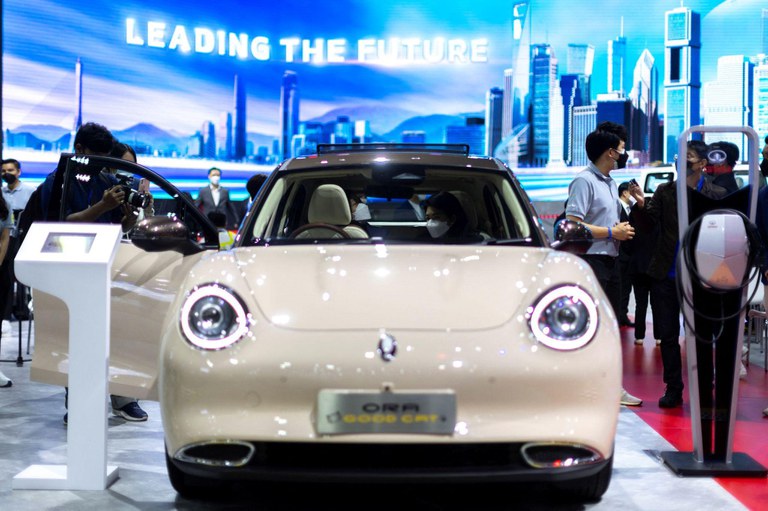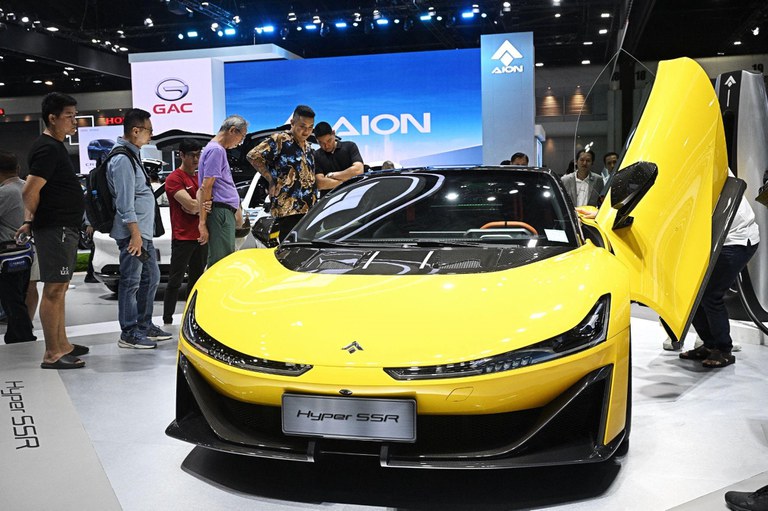Economic woes, electric vehicle aspirations jolt Thailand’s prized auto industry
2024.07.22
Bangkok
 A Seal electric car manufactured by Chinese automaker BYD is seen on a street in Bangkok, Feb. 12, 2024.
A Seal electric car manufactured by Chinese automaker BYD is seen on a street in Bangkok, Feb. 12, 2024.
Two decades ago when Winai Payakkho was a newly graduated mechanic, his goal was to enjoy the good salary and employee perks that an auto-parts company could offer.
It was a boom time in the Thai automotive industry, propelled by Japanese carmakers who transformed Thailand into Southeast Asia’s biggest producer of gasoline-guzzling cars and provided better paying jobs than farming or tourism.
But when BenarNews contacted Payakkho, 45, in early July, he was about to lose his job.
“The firm will close in October, but I am among the first batch of workers to be let go, on July 26,” he said.
His company situated in Thailand’s eastern industrial heartland manufactures glass headlights for vehicles. About five years ago, it started to feel the pinch from firms, mostly from China, that produced cheaper clear plastic for headlights, Payakkho said.
Despite diversifying to produce glass used in laboratories, the company continued to accumulate losses. Its auto business dwindled to making glass headlights as spare parts for older car models. In May it announced its closure.
The company’s plight is an example of tougher times for Thailand’s export-reliant economy in general and the auto industry in particular.
Thailand churned out about 1.8 million cars for domestic sale and export in 2023 – nearly 2% of world’s auto production – but substantially less than 2.4 million about a decade earlier.
On top of the economic challenges, the government has set a goal for electric vehicles to reach 30% of Thailand’s car production by 2030 from a small proportion now, which some blame for turning the country’s auto industry on its head and worsening its current difficulties.
Others say it’s an opportunity for Thailand to become an important spoke in the global supply chain for electric vehicles.

Adjusted production plans
The race to eliminate internal combustion engines as part of a zero-carbon future has not only prompted companies like Payakkho’s to adapt or close, but also resulted in reduced exports for Japanese car makers, said Winai Tintanod, president of the Thai Auto-Parts Workers’ Union.
“Japanese car brands have adjusted their production plans in Thailand in response to the EV policy in Thailand,” Tintanod said. “Some of them have seen their production fall by almost half in recent years.”
Recently, Subaru and Suzuki announced they would close their plants in Thailand by the end of 2024 and 2025 respectively.
Honda plans to stop production at one of its two Thai plants by 2025. Honda’s annual production in the country is now less than 150,000 vehicles a year compared with 228,000 vehicles in 2019, according to a Reuters report.
Into the gap have poured Chinese electric vehicle makers, including the world’s biggest selling EV brand BYD, which have grasped the opportunity provided by the Thai government’s incentives for EV makers. It has plowed billions of dollars into establishing manufacturing plants in Thailand.
The Japanese auto industry’s approach to low-carbon emission technologies has focused more on gasoline-electric hybrids and hydrogen fuel cells than pure electric vehicles.
James Guild, an expert in trade and economic development in Southeast Asia, said the market for EVs in Thailand is still too small to put auto parts factories out of business “at any great scale.”
“It’s probably more related to an overall weakening of demand for exports, including cars and auto parts,” said Guild, an adjunct fellow at S. Rajaratnam School of International Studies in Singapore.
“Thailand exports far more auto parts and cars than is consumed domestically, so that is likely to be a more important factor,” he said.

Still, figures for auto sales within Thailand show significant market changes are already under way.
There were more than 175,000 electric cars in Thailand at the end of May, a 168% increase from the same time last year, helped by government subsidies that lower the sticker price.
Meanwhile, overall car sales for May were down 23% from a year earlier.
The decline – driven by lower sales of gasoline cars – reflects high household debt, which leads to leasing firms not approving as many car loans, and consumers’ hesitation to spend due to the state of the Thai economy, according to the Federation of Thai Industries.
Tintanod has urged the government to come up with plans to support workers during the expected shift to electric cars.
It can be difficult for Thai workers to shift to the Chinese car plants, he said, as the plants prefer to hire migrant labor and Chinese nationals tend to occupy sought-after positions such as supervisors and engineers.
He also thinks that if Japanese automakers adapt their Thai production to lower-emission vehicles such as hybrids, “EV sales may be just 20% of the vehicle market in Thailand in the future.”
The Thai government is committed to “the EV transition having the least effects on the ICE [internal combustion engine] manufacturers,” spokesman Chai Wacharonke told BenarNews.
“There are still 10 to 20 years before ICE vehicles phase out completely from the market,” he said.
“The government has to make sure that incentives are balanced to prevent any hard landing for ICE manufacturers,” Wacharonke said. “For local workers, they can also upskill as new plants like semiconductor plants or data centers will likely employ them.”
In Tintanod’s view, it may not be that straightforward.
Some auto plants that have cut production have also lowered salaries by a quarter.
Some offer early retirement packages for workers who are 45 or older and hire temporary workers for three or six months.
“But usually those who are older than 40 will have a hard time finding another job in this sector,” Tintanod said.

Payakkho, the auto parts worker, said he had no plans to join a new company.
Instead he will move back to his home province of Nakhon Sawan, three hours north of Bangkok, and earn a living through farm work.
After 21 years of employment, Payakkho is entitled to compensation equivalent to 400 days of pay. But others who lose work such as subcontractors or have fewer years on the job are unlikely to have that cushion.
“Usually subcontractors would be the first to be let go,” he said.
Guild, the trade and economy expert, said the shift to electric vehicles is overall a good thing for reducing emissions that cause global warming.
“It would be a mistake for the government to use public funds to try and prop up internal combustion engines just to keep Japanese car manufacturers in Thailand,” Guild said.
“If Thailand plays its cards right, it will become a production hub for EV exports just as it is for internal combustion engine vehicles and parts.”







